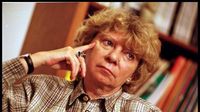Christiane Brunner, the former president of the Swiss Social Democratic Party (SP), passed away at the age of 78, leaving behind a significant legacy in Swiss politics and the women's movement. Brunner, a prominent figure in Geneva's political landscape, was confirmed dead by her family on April 18, 2025. Her career spanned decades, during which she served as a National Councillor from 1991 to 1995 and as a member of the Council of States from 1995 to 2007.
Brunner's tenure as SP president from 2000 to 2004 marked a pivotal period in the party's history. Known for her dedication to equality and labor rights, she was a fierce advocate for social justice throughout her political career. The SP released a statement expressing deep sorrow over her passing, noting that "Christiane Brunner dedicated her life to equality and workers' rights," and extended condolences to her family.
Brunner's political journey was not without its challenges. She was the official SP candidate to succeed René Felber in the Federal Council election on March 3, 1993. However, instead of Brunner, the parliamentary majority chose her party colleague Francis Matthey, a decision that sparked significant protests, particularly among women. Following public outcry and internal party dissent, Matthey eventually declined the position, leading to a subsequent election on March 10, where Ruth Dreifuss was elected, marking a historic moment as the first woman to serve in the Federal Council.
Reflecting on her career, Brunner once stated, "As an icon, I don't see myself. I have fought for women my whole life, and that is all." This humility belied her substantial impact on Swiss society, particularly in advancing women's rights. Her efforts were instrumental in shaping the feminist movement in Switzerland, particularly when she successfully persuaded the Swiss Federation of Trade Unions to organize a women’s general strike, a landmark event in the country’s history.
Brunner's roots in Geneva were humble; she often spoke about her challenging upbringing, which included a violent father and a conservative home. Despite these obstacles, she excelled academically, thanks in part to a dedicated teacher who encouraged her to pursue a scholarship. This opportunity allowed her to study law, specializing in labor and social law, and to work closely with trade unions.
Her political activism began in the late 1960s, influenced by the student movement of that era. Joining the SP, she found a party that resonated with her commitment to equality. Brunner held various leadership roles, including President of the Federation of Public Services and later leading the merger of the Metal and Watch Workers' Federation with the Construction and Industrial Syndicate, which formed today's Unia.
Brunner's legacy as a trailblazer for women in politics is well recognized. Mattea Meyer, co-president of the SP, expressed her condolences, saying, "She paved the way for my generation with her tireless and convincing commitment to women's rights." Brunner's influence extended beyond her immediate political environment, shaping the discourse around gender equality and labor rights in Switzerland.
Her non-election to the Federal Council in 1993 remains a significant moment in Swiss history, illustrating the gender biases that persisted within the political system. The backlash from that decision highlighted the urgent need for change, and Brunner's experience became a rallying point for advocates of women's rights.
In her later years, Brunner stepped back from active politics in 2007 but maintained her commitment to social issues. She was known for her ability to bridge divides, even fostering a constructive relationship with Ueli Maurer, then president of the Swiss People's Party (SVP), despite their ideological differences. Her approach demonstrated her belief in collaboration as a means to achieve social progress.
Brunner's contributions to the feminist movement in Switzerland are undeniable. She was not only a politician but also a symbol of resilience and determination. Her passing marks the end of an era for many who admired her commitment to social justice and equality.
As Switzerland mourns the loss of Christiane Brunner, her legacy will undoubtedly continue to inspire future generations of leaders and activists. Her life’s work has left an indelible mark on the political landscape, and her advocacy for women's rights will resonate long into the future.
In a country where women's representation in politics has gradually improved, Brunner's efforts were foundational in paving the way for others to follow. As the SP reflects on her contributions, it is clear that Christiane Brunner was more than a politician; she was a champion for change, a voice for the voiceless, and an unwavering advocate for equality.









